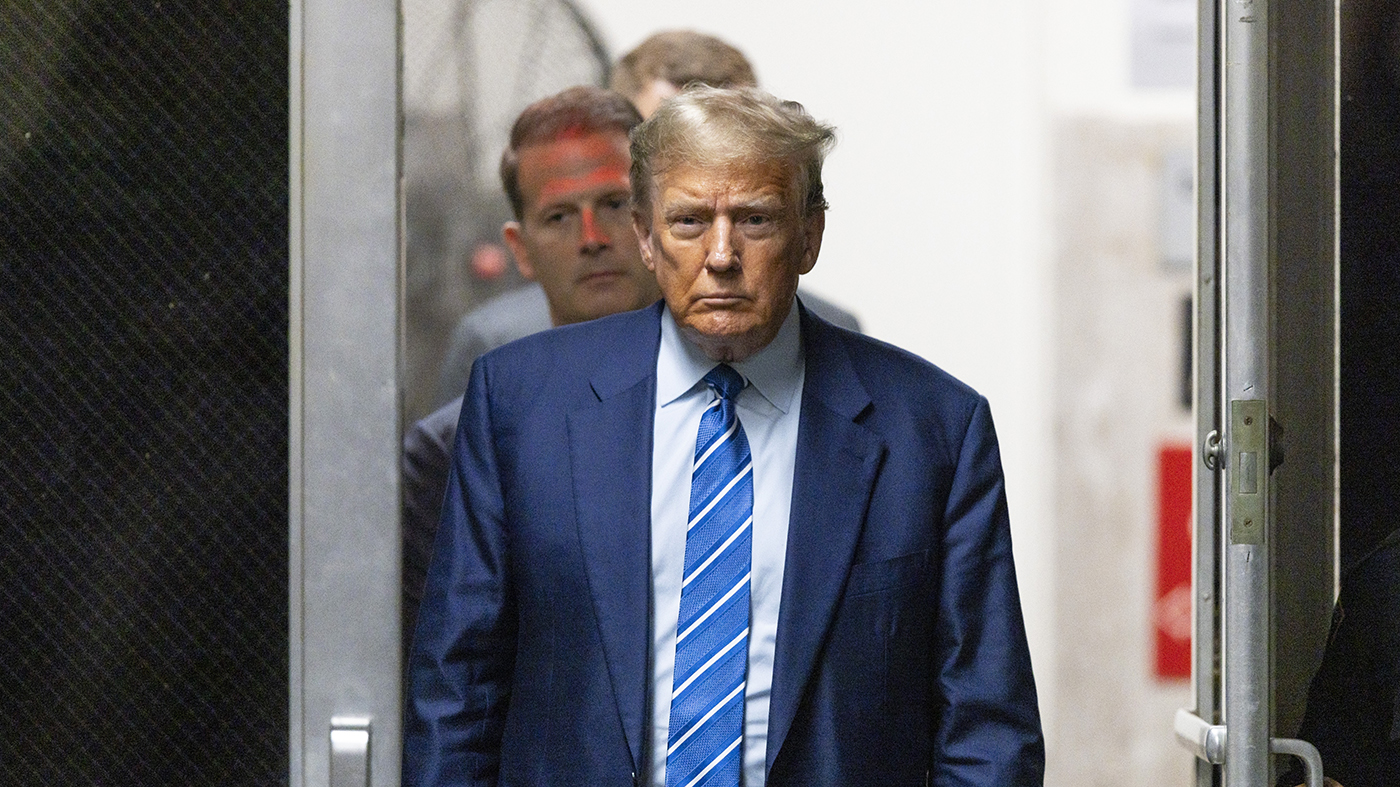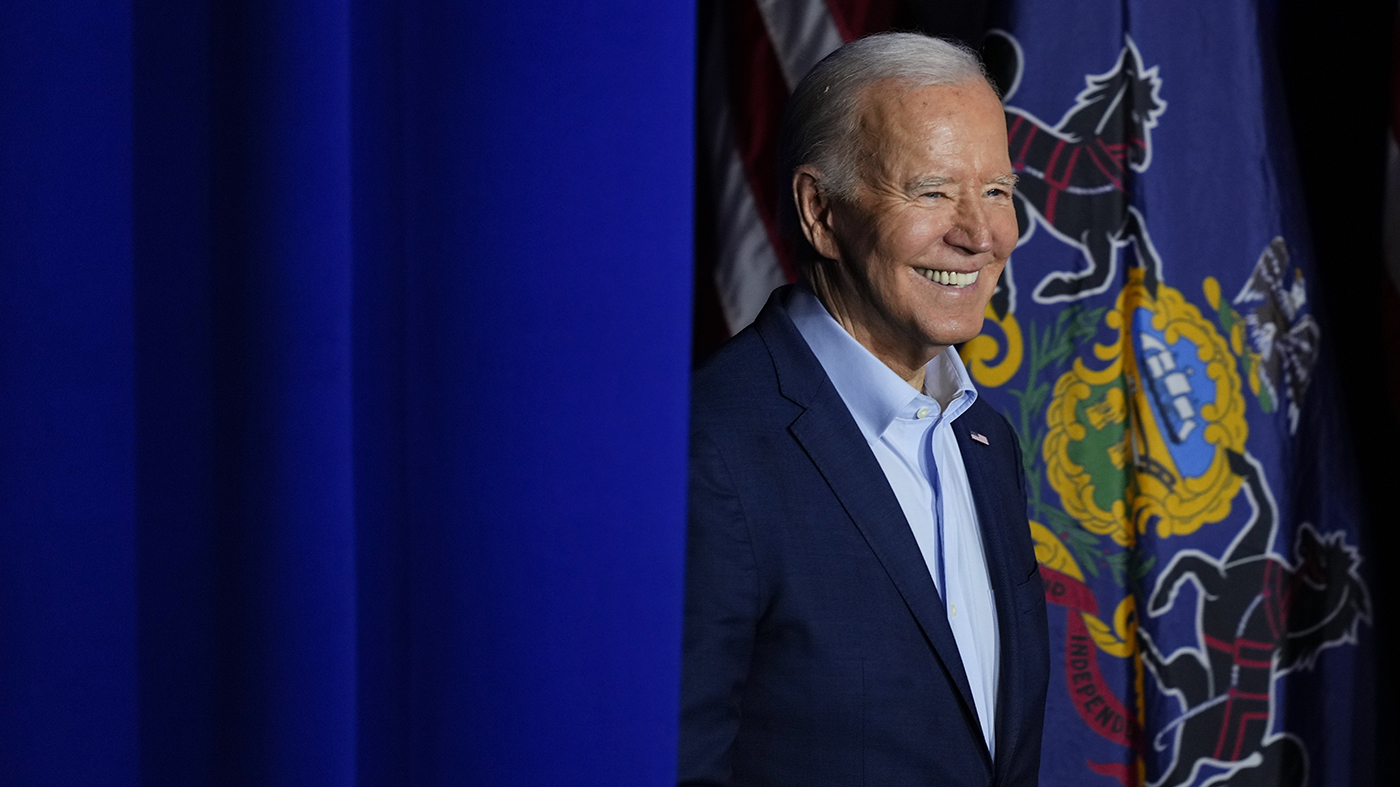Morning Report — Amid threats to his job, Johnson goes all in
Editor’s note: The Hill’s Morning Report is our daily newsletter that dives deep into Washington’s agenda. To subscribe, click here or fill out the box below.
It’s all on the line for Speaker Mike Johnson (R-La.).
The Speaker is taking a gamble on a package of foreign aid that’s cleaved his conference and threatened his gavel, brushing off his detractors in a go-for-broke effort to help beleaguered allies overseas. The multipronged, four-bill strategy to provide military assistance to Ukraine, Israel and Taiwan, accompanied by a grab-all package of Republican national security priorities, has won early support from Democrats. The national security package is designed to appease wary conservatives within the House GOP — and stave off potential threats of an ouster.
Rep. Marjorie Taylor Greene (R-Ga.) is the most prominent GOP lawmaker to voice outright opposition to the foreign aid package; she has also filed a motion to vacate that could strip Johnson of his post. While conservatives are rumbling about voting against the measure, they haven’t committed yet.
▪ The Washington Post: Momentum builds to oust Johnson from the Speakership.
▪ The Hill: Rep. Thomas Massie (R-Ky.) announced to colleagues Tuesday that he will co-sponsor Greene’s resolution that could oust Johnson from the Speakership he’s held for less than six months.
Johnson, meanwhile, is vowing that all four components of the legislation will get separate votes before the week is out and adhere to the House rule of giving lawmakers 72 hours to review legislation. Democrats are waiting for Johnson to release the precise details of his plan. At that time, said Rep. Pete Aguilar (D-Calif.), several top Democrats — including the heads of the Intelligence, Foreign Affairs and Appropriations committees — will review the four bills to ensure they pass the substance “test” meriting Democratic support.
Over in the Senate, Democrats say they’re open to the possibility of backing the proposal, even as they raise concerns about potential landmines. They’re by no means enthusiastic about Johnson’s maneuver, but they seem prepared to accept it to help Kyiv’s beleaguered forces.
“Nothing that goes on in the House makes any sense,” Sen. Elizabeth Warren (D-Mass.) said. “But if that’s a way that the Speaker is going to get aid to Ukraine in front of House members, who by a large majority would support it … then OK.”
The White House is taking a wait-and-see approach to Congress’s plans, with aides not ruling out the four-bill package — but not ready to embrace it either. Officials said President Biden, who spoke with Johnson on Monday, is reserving judgment until he sees more details.
3 THINGS TO KNOW TODAY:
▪ The administration today called for a steep hike in tariffs on Chinese steel and aluminum. President Biden will discuss his proposals today in Pittsburgh while visiting steelworkers.
▪ U.S. economic performance is partially the result of the country’s unsustainable fiscal practices, creating risks for the global economy, the International Monetary Fund warned Tuesday.
▪ 🏀 College basketball superstar Caitlin Clark is set to soar to new heights in the WNBA — but her rookie contract will see her pocket a fraction of the millions her male counterparts have made on the court, raising questions of pay equity in sports.
👉 Impeachment: Not since 1876 has a Cabinet member navigated an impeachment trial. Homeland Security Secretary Alejandro Mayorkas officially is in the Senate hot seat after the House on Tuesday sent the upper chamber two articles of impeachment alleging failure to enforce immigration law. Senate Majority Leader Chuck Schumer (D-N.Y.), who accuses House Republicans of stooping to political theater, opposes a trial and is expected today at some point to offer a motion to dismiss the charges based on an argument that Republicans presented policy disagreements, not evidence of high crimes or misdemeanors.
▪ The Hill: The House Energy and Commerce Committee is holding a hearing today on a series of tech safety bills aimed at boosting data privacy standards and child online safety.
▪ The New York Times: Privacy advocates are raising alarms about a mysterious provision the House added to a surveillance bill last week. The Senate may vote on the measure within days.
▪ The Hill: Two Senate committees will hold back-to-back hearings today scrutinizing Boeing, the first since the door panel of a Boeing 737 Max 9 blew off during an Alaska Airlines flight in January.
▪ The Hill: Impatience over a stalled tax deal grows in the Senate.
LEADING THE DAY
COURTS
Supreme Court justices sounded wary Tuesday of letting prosecutors use a federal obstruction law to charge hundreds of rioters involved in the Capitol attack on Jan. 6, 2021 (The New York Times and The Hill). A decision is expected in late June, but it’s unclear how a ruling would impact the Jan. 6-related convictions. Most such defendants have not been charged under the provision at issue Tuesday, which prosecutors applied in the most serious cases.
If the high court rules against the government’s interpretation of the law, the result could potentially disrupt some prosecutions and eliminate half of the charges against former President Trump in the federal case accusing him of plotting to subvert the 2020 election.
Tuesday’s argument before the court centered on the Sarbanes-Oxley law, which was enacted to address white-collar crime. It makes it illegal to corruptly obstruct, influence or impede any official proceeding. Justices’ questions considered the gravity of the Jan. 6 attack at the Capitol and whether prosecutors have been stretching the law’s intent. Those who have been charged under the law’s provision faced other criminal counts as well.
Republicans supportive of Trump are using the Supreme Court challenge by a convicted Jan. 6 attacker to reframe as a political protest the 2021 insurrection in which rioters injured 174 law enforcement officers, lawmakers and their staffs were sent into hiding and five people involved in the events died within 36 hours.
HUSH MONEY, DAY TWO: Trump will return Thursday to a Manhattan courtroom as a criminal defendant accused of falsifying business records to cover up a sexual scandal involving a porn star. Seven jurors have been selected and told to report to court on Monday, while 11 others remain to be picked.
As he left the courthouse Tuesday, the former president stopped in a hallway to address reporters. “We are going to continue our fight against this judge,” he said, accusing Judge Juan Merchan of “rushing” the criminal trial.
Ninety-six prospective jurors will return Thursday for what is turning out to be a fast-moving selection process that could wrap up this week. Opening arguments could begin next week.
Trump, resuming his White House campaign, ended his second trial day with an evening event at a bodega in Harlem to focus on urban crime, a deadly and disputed incident two years ago at the store (CBS News, New York Post) and criticism of jurisprudence in Democrat-governed New York.
“If you have a gun, what happens?” Trump inquired of those jammed inside the tiny store while adding that being robbed is “almost a way of doing business.” Without waiting for a definitive reply, he wondered if proprietors could obtain a gun license. “By the way, if you had a gun, maybe you’d never get robbed. You’d never get robbed. That would be the end of it,” he said(Video).
▪ The Hill: Here are the first seven jurors selected for Trump’s New York trial.
▪ The Hill’s Niall Stanage rounded up five things to know after the trial’s second day.
© The Associated Press / Justin Lane | Former President Trump arrived at a Manhattan court as a criminal defendant Tuesday for the second day of jury selection during his hush money trial.
WHERE AND WHEN
The House will meet at 10 a.m.
The Senate will convene at 1 p.m. Senators are expected to be sworn in as jurors for a Mayorkas trial after receipt from the House of two articles of impeachment.
The president begins his day in Scranton, Pa., with the President’s Daily Brief at 9:30 a.m. Biden will travel to the Pittsburgh headquarters of the United Steelworkers to deliver remarks at 1:45 p.m. after an hour of greetings with union members. Biden will return to the White House this evening.
Vice President Harris will depart Los Angeles and arrive in Washington tonight.
Secretary of State Antony Blinken is on the island of Capri in Italy to participate this evening in a Group of Seven foreign ministers’ welcome ceremony and reception. He will meet at 7:15 p.m. local time with Antonio Tajani, the Italian deputy prime minister and foreign minister. Blinken will join a group photo with his counterparts from the G7 and attend a working dinner.
Treasury Secretary Janet Yellen will participate today in meetings in Washington of the International Monetary Fund (IMF) and the World Bank. This morning she meets with Minister of Finance Shun’ichi Suzuki of Japan and Minister of Economy and Finance Sangmok Choi of Korea. Yellen at 11:30 a.m. will join a roundtable at the IMF devoted to global sovereign debt. At the World Bank this afternoon, the secretary will join a ministerial discussion about Ukraine, followed by a bilateral meeting with German Finance Minister Christian Lindner. Yellen at 3 p.m. will confer with Prime Minister Denys Shmyhal of Ukraine at the World Bank. Both will then take questions from reporters. About an hour later, Yellen will join a meeting held at the IMF of Group of Seven finance ministers and central bank governors. Her itinerary closes with a working dinner for Group of 20 finance ministers and central bank governors.
First lady Jill Biden at 4 p.m. will host an East Room event focused on employment opportunities for military spouses. (The administration focused this morning on expanding telework overseas opportunities for military spouses who work for the U.S. government.)
ZOOM IN
© The Associated Press / Matt Rourke | President Biden campaigned in his hometown, Scranton, Pa., Tuesday.
POLITICS
SPLIT SCREEN: Biden is campaigning in Pennsylvania while promoting steel tariffs against China, slamming the former president’s tax policies and passing the hat for his race. Trump, in contrast, has been in a Manhattan courtroom for most of two days while challenging criminal charges. The contrasting optics may help Biden’s reelection bid, according to Democrats, who note the president’s job approval rating edged up this week for the first time since November (The Hill). It could also work the other way: The hush money trial could boost Trump’s presidential bid, some analysts and political strategists say (Reuters).
2024 ROUNDUP:
▪ Bob Graham, former Democratic governor of Florida and former senator, died at age 87, his family announced Tuesday. Graham served three terms in the Senate. In 2004, he launched an unsuccessful bid for the Democratic presidential nomination predicated on his opposition to the U.S. invasion of Iraq and assertions that former President George W. Bush distorted intelligence. “I consider my voice to be a centrist moderate voice,” he said during that Democratic primary.
▪ Would a guilty verdict in the Trump hush money trial upend other 2024 contests? Republican senators explain to The Hill’s Alexander Bolton why they discount that theory.
▪ Biden is losing support to Trump among Hispanics, particularly men, polls show. The demographic is part of a coalition that Democratic candidates have long prized (The Hill and The New York Times).
▪ Candidates across the spectrum filed first-quarter fundraising totals with the Federal Election Commission. Here’s what we’ve learned so far.
▪ U.S. voters view Trump as better for the economy than Biden, as the incumbent’s approval rating ticked lower in April from the previous month, according to a new Reuters/Ipsos poll.
▪ Senate Democrats’ campaign arm is launching a $79 million advertising plan that’s aimed at retaining the party’s majority.
▪ Advocates launched an organized drive Tuesday to get 60,000 signatures by June 21 to put abortion rights on the Montana ballot this year.
ELSEWHERE
© The Associated Press / Ohad Zwigenberg | Israeli Prime Minister Benjamin Netanyahu, pictured earlier this year in Jerusalem, is juggling multiple threats to his country.
INTERNATIONAL
Israeli Prime Minister Benjamin Netanyahu’s war Cabinet met again Tuesday to consider a response to Iran’s weekend attack, though no decision has been announced on a path forward (ABC News).
Several options — ranging from diplomacy to an imminent strike — are under consideration. U.S. and European leaders are urging Israel to avoid triggering a wider Middle East war. Israel’s foreign minister, Israel Katz, said Tuesday he was “leading a diplomatic offensive” calling for more global sanctions against Tehran. But he said such penalties should come “alongside the military response” (The New York Times). Iran is the second most-sanctioned country in the world after Russia. A military response by Israel risks further expanding the shadow war between the two foes into a direct conflict (The Associated Press).
▪ The Washington Post: Iran and Israel’s shadow war has lasted years: Key moments before the attack.
▪ Bloomberg News: The U.S. will impose new sanctions on Iran targeting the country’s missile and drone program to “contain and degrade Iran’s military capacity and effectiveness.”
Russian forces continue to pummel eastern Ukraine in a bid to advance farther into the Donetsk region while Ukraine continues to suffer shortages of manpower and weapons. Analysts at the Institute for the Study of War said Monday that Ukrainian forces’ ability to repel intensified Russian offensive operations in eastern Ukraine has “degraded due to materiel shortages and will likely continue to degrade in the near future should delays in U.S. security assistance continue” (CNBC).
The New York Times: Ukraine sees “hypocrisy” in Western allies’ defense of Israel.
OPINION
■ Is Jan. 6 the political winner Democrats think it is? by Jason L. Riley, columnist, The Wall Street Journal.
■ U.S. opposition to an Iran-Pakistan gas pipeline risks losing an entire region to China, by James Durso, opinion contributor, The Hill.
THE CLOSER
© The Associated Press / Mark Baker | Koalas, endemic to Australia, face increasing threats to their habitats and health.
And finally … 🐨 Long an Australian icon, the koala has become an emblem of the country’s biodiversity crisis. The animals, which eat only eucalyptus leaves and live only in Australia, are threatened by deforestation, climate change and infectious disease. Taken together, these factors put the koala at risk of extinction. Scientists estimate populations have plummeted by as much as 80 percent in some locations.
“We don’t know what the threshold is where there’s a point of no return,” said Tanya Pritchard, the senior manager for species recovery and landscape restoration at the World Wide Fund for Nature-Australia. “So, we do need to act pretty urgently.”
Scientists and conservation groups are giving the koala everything they’ve got. Some are pursuing traditional strategies, including the protection of koala habitats and the advocacy of tougher conservation laws. Others are trying more experimental approaches, from koala probiotics to tree-planting drones.
The New York Times breaks down some of the koala conservation strategies being employed Down Under.
Stay Engaged
We want to hear from you! Email: Alexis Simendinger (asimendinger@digital-stage.thehill.com) and Kristina Karisch. Follow us on social media platform X: (@asimendinger and @kristinakarisch) and suggest this newsletter to friends!
Copyright 2023 Nexstar Media Inc. All rights reserved. This material may not be published, broadcast, rewritten, or redistributed. Regular the hill posts















